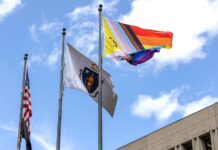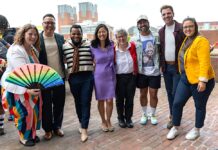A diverse group of people identifying as LGBTQA, white, pan-Asian and Latino stood together to block rush-hour traffic on Interstate 93 north and south of Boston Thursday, Jan. 15. Their stance? Solidarity with the protestors in Ferguson, Mo. and all those committed to expanding the conversation on U.S. race relations.
Protestors in northbound lane issued a statement to the Boston Globe which included:
“Today, we place our bodies in the street for four and a half hours, the same amount of time Mike Brown lay dying in the streets of Ferguson, Missouri. We are a diverse group of LGBTQA, white, pan-Asian and Latin@ people acting in solidarity with Black Lives Matter, both locally and nationally. We stand behind the demands released by organizers in Ferguson, which can be found at http://fergusonaction.com/demands/
We are participating in this action in response to a national call for non-Black people to turn up for two central reasons. As non-Black people acting in solidarity, it is necessary to disrupt a capitalist structure that has been built on the physical and economic exploitation of Black bodies since our country’s inception. We also recognize our unique position in the struggle for economic, political, gender and racial liberation: though many of us do identify as people of color, we are able to participate in such an action with significantly lower risk of physical harm and brutalization by the State specifically because we are NOT identified as Black.”
The Boston Globe reported on both I-93 shutdown groups as follows:
Activists have shut down Interstate 93 Southbound and Northbound during morning rush hour commute into Boston to “disrupt business as usual” and protest police and state violence against Black people.
Two different groups of activists linked their bodies together across the highway in coordinated actions north and south of Boston. This action was in solidarity with the Black Lives Matter movement. This diverse non-Black group of Pan-Asians, Latinos, and white people, some of whom are queer and transgender, took this action to confront white complacency in the systemic oppression of Black people in Boston.
“Today, our nonviolent direct action is meant to expose the reality that Boston is a city where white commuters and students use the city and leave, while Black and Brown communities are targeted by police, exploited, and displaced,” said Korean-American activist Katie Seitz.
Disgruntled commuters sympathetic to the protester demands—who were late to meetings and other appointments—might take some comfort knowing they, too, contributed to this large nonviolent act led by a relatively small, diverse group who came together to take a stand for racial equality.









